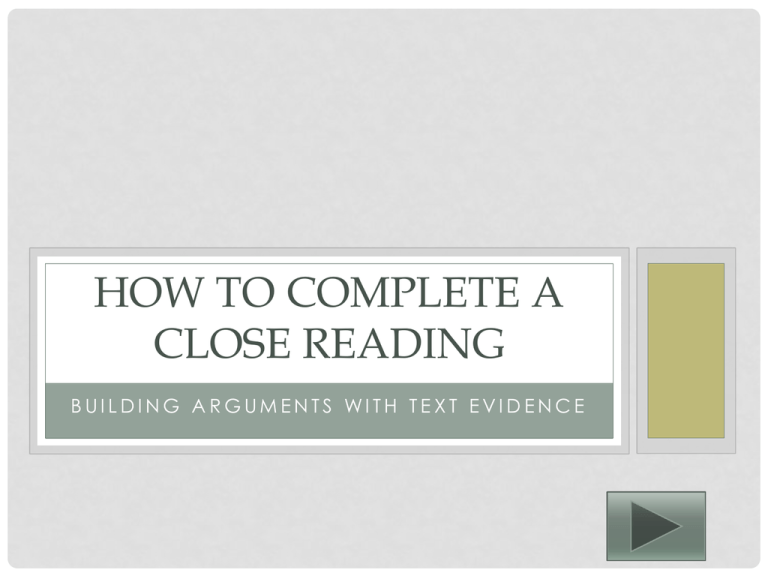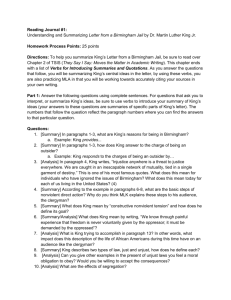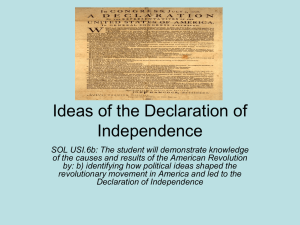Multi-media tutorial presentation
advertisement

HOW TO COMPLETE A CLOSE READING BUILDING ARGUMENTS WITH TEXT EVIDENCE STANDARDS AND OBJECTIVES • • • • • Comparing Great American Documents-Life, Liberty, and The Pursuit of Happiness? Standard 8.23 Determine the central ideas expressed in the Declaration of Independence and write an expository piece in which the legacy of these ideas in today’s world is described and validated with supporting evidence from the text. In the classroom, students will read and analyze various United States’ documents that directly discuss American’s “Liberty”; juxtaposing these documents with the Declaration of Independence in order to discover whether America has lived up to its creed. • • • • • • ESSENTIAL QUESTIONS 1. Does America live up to its creed of “All Men Are Created Equal?” 2. What is equality? What is Liberty? 3. How has the concept of Liberty evolved over the centuries? 4. How can Americans achieve Liberty? 5. How am I included in the founding father’s ideals of “Life, Liberty, and the Pursuit of Happiness?” • • • MATERIALS: Thomas Jefferson: “Declaration of Independence” (Anchor Text) Dr. King’s Response: “Letter From Birmingham Jail” TASK SHEET - ENGAGING IN THE TASK PART I • Read the Declaration of Independence again on your own. • After reading the text of The Declaration of Independence, as a table group, develop a chart in which you list and explain words and phrases that are used in the text that represent liberty. • Then individually on an index card, write a paragraph examining what the text shows you about the author’s perspective on liberty. Cite specific evidence from your group’s chart. QUOTES FROM THE DECLARATION OF INDEPENDENCE • • • • • • • • • • • • “…all men are created equal” – 11 “Endowed by the Creator with certain unalienable rights” – 13-14 “deriving their just powers from the consent of the governed.” 15-16 “it is the Right of the People to alter or to abolish it, and to institute a new Government.” 17-18 “Safety and Happiness” – 19 “it is their right, it is their duty, to throw off such Government, and to provide new Guards for their future security.” – 27-28 “Public Good” – 37 “We must therefore, acquiesce in the necessity, which denounces our Separation, and hold them, as we hold the rest of mankind, Enemies in War, in Peace Friends.” 118-119 “united States of America” – 121 “..of Right ought to be Free and Independent States.” – 125 “…and that as Free and independent States, they have the full Power to levy War, conclude Peace, contract Alliances, establish Commerce, and to do all other Acts and Things which Independent States may of right do. “Absolved from all Allegiance to the British Crown” – 126-127 CHARTING EXAMPLE – WITH YOUR GROUP, CREATE A LIST OF THE ITEMS YOU BROUGHT OUT OF THE DECLARATION OF INDEPENDENCE. PARAGRAPH EXAMPLE – USE THE QUOTES YOU PULLED FROM THE DOCUMENT TO EXPLAIN YOUR ANSWER AND TO JUSTIFY YOUR CONCLUSIONS. • To break all political ties with England, the independent seeking colonists write a document that declares their separation and gives their rationale behind their actions. The document is meant for the King of England, but the writers of the document know the importance of the declaration will ensure the longevity and open reading of the document by many. Liberty is the foundational theme for the Declaration of Independence. Jefferson references the idea of liberty several times throughout the document. He infers that liberty is a “Law of Nature,” and is given to man by God. “They are endowed by their Creator with certain unalienable rights.” The Parliament of England has “usurped” the liberty of the colonists; and in doing so, has brought about the rebellious actions on the American continent. Jefferson states that government should derive, “their powers from the consent of the governed,” or the people. The lack of colonial representation provides the motivation the colonists need to absolve themselves of said government and “institute a new Government,” based on the ideals of “Safety and Happiness.” Jefferson declares these attributes as liberty – “Happiness,” “Safety,” and most of all the “duty” to replace those that abuse power and to procure the protection of the people under this new government. TASK SHEET: ENGAGING IN THE TASK PART II • Reread Letter from Birmingham Jail on your own. • After reading the text of Letter from Birmingham Jail, again as a table group, continue your chart in which you now list and explain words and phrases that are used in the letter that represent liberty. • Again, individually on an index card, write a paragraph examining what the text shows you about the author’s perspective on liberty. Cite specific evidence from your group’s chart. QUOTES FROM LETTERS FROM A BIRMINGHAM JAIL – GO THROUGH THE DOCUMENT AND PULL QUOTES THAT REFERENCE OR SUPPORT KING’S THOUGHTS ON LIBERTY. • “Injustice anywhere is a threat to justice everywhere.” – 35 • “…tied in a single garment of destiny.” – 36 • “Anyone who lives inside the United States can never be considered an outsider anywhere within its bounds.” – 38-40 • “self purification” – 74 • “…we see the need for nonviolent gadflies to create the kind of tension in society that will help men rise from the dark depths of prejudice and racism to the majestic heights of understanding and brotherhood.” – 105-107 • “The purpose of our direct action program is to create a situation so crisis packed that it will inevitably open the door to negotiation” – 109-110 • “Lamentably, it is an historical fact that privileged groups seldom give up their privileges voluntarily.” – 125-126 • “We know through painful experience that freedom is never voluntarily given by the oppressor; it must be demanded by the oppressed.” – 130-131 • “The answer lies in the fact that there are two types of laws: just and unjust.” – 174 • “ One has not only a legal but a moral responsibility to obey just laws. Conversely, one has a moral responsibility to disobey unjust laws. I would agree with St. Augustine that ‘an unjust law is no law at all’.” – 176-177 QUOTES FROM LETTERS FROM A BIRMINGHAM JAIL - CONTINUED • “An unjust law is a human law that is not rooted in eternal law and natural law. Any law that uplifts human personality is just. Any law that degrades human personality is unjust. All segregation statues are unjust because segregation distorts the soul and damages the personality. It gives the segregator a false sense of superiority and the segregated a false sense of inferiority.” – 183-188 • “A law is unjust if it is inflicted on a minority.” – 204 • “Sometimes a law is just on its face and unjust in its application.” – 213 • Lukewarm acceptance is much more bewildering that outright rejection.” – 255256 • “Birthright of Freedom.” - 340 • “Oppressed people cannot remain oppressed forever.” – 338 • “We will reach the goal of freedom in Birmingham and all over the nation, because the goal of America is freedom.” – 495-496 • “sacred heritage of our nation.” - 505 • “One day the South will know that when these disinherited children of God sat down at lunch counters, they were in reality standing up for what is best in the American dream and for the most sacred values in our Judaea Christian heritage, thereby bringing our nation back to those great wells of democracy which were dug deep by the founding fathers in their formulation of the Constitution and the Declaration of Independence.” 544-549 CHARTING EXAMPLE PARAGRAPH EXAMPLE: WRITE A PARAGRAPH ABOUT THE PURPOSE OF THE LETTER FROM A BIRMINGHAM JAIL AND THE AUDIENCE KING INTENDED TO READ IT. BACK UP YOUR ANSWERS WITH TEXT. • King is discussing a moral wrong that is taking place in America during this time. Segregation and the Jim Crow laws had plagued the social structure of the South for over 50 years at this point and had created a false sense of superiority/inferiority. In his Letter from a Birmingham Jail, King states, “Any law that degrades human personality is unjust. All segregation statues are unjust because segregation distorts the soul and damages the personality. It gives the segregator a false sense of superiority and the segregated a false sense of inferiority.” In his letter to the clergymen of Birmingham, King states that, “injustice anywhere is a threat to justice everywhere.” The purpose of King’s letter is to put the social injustices taking place into blunt writing. He knows there is a need for change, and that the change cannot be done if the leaders and politicians of the region are “by standing” and not taking action. He is admonishing the clergy for not playing more of an active role in fight against this injustice. While the letter is for the clergy, it is also meant for the people as a whole. He states, “ One has not only a legal but a moral responsibility to obey just laws. Conversely, one has a moral responsibility to disobey unjust laws.” While people continue to obey the unjust laws that keep the races segregated, there will be no equality or justice in the South or in America. TASK SHEET – ENGAGING IN THE TASK PART III • Finally, citing pertinent information from The Declaration of Independence and Letter from Birmingham Jail in your table group, create a chart to compare and contrast the texts and how they develop their ideas of liberty over the course of their texts. • Again, individually on an index card, write two paragraphs. In one paragraph compare how the words and/or phrases used in the two texts to identify how the two texts are similar and another paragraph to contrast the two texts. Again cite specific evidence from your group’s charts and the texts to support your claims. • From these close readings of the texts, students may be asked to use their charts and index cards to write an expository essay in which they compare and contrast the ideas within the Declaration of Independence with other contemporary writings. COMPARISON: TAKE THE TWO DOCUMENTS AND NOW COMPARE AND CONTRAST THEM. DETERMINE HOW THE IDEAS OF LIBERTY ARE SIMILAR AND DIFFERENT. USE THE TEXT TO SUPPORT YOUR CONCLUSIONS. Declaration of Independence Both Letter from a Birmingham Jail - - - - Independence The audience is the oppressor (Parliament) Totally want to break away from authority Formal rebellion Possible violence Political enemy Issue of taxation and representation - - Appeal to god and natural law. – both contend that liberty is a right given by God. Discussion of just and unjust laws A struggle with the laws of man Peace Both audiences have to do with people who are supposed to support/protect the people. Civil disobedience Both struggle for the freedom of the oppressed - Interdependence The audience is a supposed ally (the clergy) Want to work/negotiate with the authority. Information rebellion Non-violent Enemy is racism Moral issue VISUAL IMAGE OF CHART CONCLUSIONS TO BE DRAWN BASED ON THE IDEA OF LIBERTY AND THE USE OF THE TWO DOCUMENTS. BE SURE TO CONNECT WITH TEXT EVIDENCE. • Both men determine that one must be ready for the consequences. Death was a possible consequence for those that wrote the Declaration of Independence, both in the war and after if they had lost. Death was a consequence for King. Consequences for these actions did not fall on only the authors of these documents, but also those involved in the movements these men were leading. Consequences also fell upon innocent people with no connection. An example of these consequences is the bombing of the Birmingham church and the young girls that were killed in that explosion. I have attached a video that puts Langston Hughes poem: Ballad of Birmingham to music. • https://www.youtube.com/watch?v=cHxG2b4rAlA






